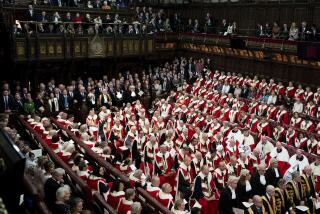The Kennedys Are Many Things, Just Not Royalty
- Share via
BRUSSELS — On the day last week that hope died of finding any survivors from the small aircraft carrying John F. Kennedy Jr. and his wife and sister-in-law, the heir to the throne of Italy filed suit in the European Court of Human Rights.
The son of King Umberto II, who gave up his throne in 1946 as punishment for his family’s support of Italian fascism, is seeking the right to return home. After his father’s abdication, the new republican government of Italy barred the former king, his heirs and consorts from Italian soil forever.
They did so for a reason, which explains why the modern government of Italy is even now arguing in court to uphold that decree of exile passed in a more heated time. Kings are more than just people with quaint titles and old palaces. They are political symbols whose influence spreads far beyond their own persons to embrace a whole social order and a specific concept of the state. Italy’s republican governments understand this, which helps illuminate, if not explain, the apparently churlish decision to enforce the continued exile of the former royal house of Savoy.
We use the metaphor of royalty often and perhaps too lightly these days, and seldom more so than in the tragic context of recent days, when the rather tired concept of the Kennedy family as the nearest America has to royalty has been exhaustively deployed.
At first glance, the family does embody some of the characteristics of royalty. They are extremely wealthy, and their most prominent members are instantly recognizable. They have glamour and a degree of political power and enduring influence. They have, like a royal family, undergone private dramas and intimate tragedies in the most public of settings. Their fates and names are as familiar to us as those of our own kin.
They are a dynasty, with a patriarch in Joseph, father of the president, and a matriarch in Rose. Since the patriarch was the former ambassador to the Court of St. James, they even mingled with real royalty: the future president of the United States taking tea with the future queen of England, Scotland, Wales and Northern Ireland.
Like in a royal family, the duties passed from one brother to the next. The death in World War II of the eldest son, Joseph Jr., already groomed for a political career, meant that mantle was inherited by the second son, John F. Kennedy. With his assassination in 1963, the sense of obligation was transferred to Robert F. Kennedy, who ran for the presidency in 1968, to be assassinated, in turn, after winning the California primary, at what seemed like the moment of success.
The mantle then passed to Edward M. Kennedy, in rather the same way the English throne passed, in turn, from King Henry VIII’s son, Edward VI, who died young, to Henry’s elder daughter, Mary, and then to his younger daughter, Elizabeth. The end, with the crash of the small plane off Martha’s Vineyard last weekend, of the direct male line of succession from the late President Kennedy, carries its sonorous echo of dynastic death.
The metaphor of royalty has been then as understandable as it has been inescapable. But there is something fundamentally wrong with it. The metaphor is, in a precise sense for a nation born in rebellion against the crown, un-American.
Consider, after all, what it means to be born in a country ruled by a crowned head. The holder of the traditional blue British passport is not a citizen but a British subject. The courts of law where British justice is done are called the Queen’s Bench. The case against a defendant is not brought, as in the U.S., by the people, but by the crown.
The British armed forces do not swear an oath of allegiance to a flag or constitution, but to the monarch. A military officer receives a royal commission. No law passed by both houses of Parliament is formally enacted until and unless the monarch has signed it.
The second chamber of the British Parliament is the House of Lords, composed of people born or raised by the queen into the nobility. There are life peers, whose title dies with them, but more than two-thirds are members of the hereditary aristocracy and have no other claim to their power to amend and pass British laws than the accident of birth that put them there.
There is an exception for the bishops of the Church of England, who sit in the House of Lords as of right. But they are formally appointed to the Episcopal sees by the crown, the head of the Church of England ever since King Henry VIII founded it more than 450 years ago. That is why British coins, which like British postage stamps carry the queen’s head, have the words “Fid Def” around the rim. That stands for the Latin phrase, “Defensor Fidelis”--Defender of the Faith.
Life in Britain is not quite as feudal as this sounds. The queen seldom exercises her sweeping political powers and almost invariably follows her government’s advice in the appointment of bishops, peers and the like. The House of Lords is to be reformed by the new British government of Prime Minister Tony Blair, and current plans call for the bulk of the hereditary peers (though not all) to be stripped of their right to vote in the House of Lords. There is even talk of scrapping the title Defensor Fidelis, in a Britain where regular worshipers in the Church of England are in danger of being overtaken by both Catholics and Muslims.
But the old memories of the divine right of kings do keep cropping up. When a prime minister resigns in office, as Harold Macmillan did in 1963, it was the queen who decided (after taking advice) whom she would summon to replace him. When the parties are so evenly balanced after an election that it is not immediately obvious who has won, as in 1974, it is the queen who sends for the person she thinks can form a government that can carry a majority in the House of Commons. This ceremony of appointment is known as kissing hands, a direct echo of the feudal custom of a vassal signifying his allegiance by kissing the hands of his lord.
After all, prime minister is not Blair’s title. The proper term for his function is her majesty’s first lord of the Treasury, which is why former prime ministers can expect as of right a peerage, in the way that Macmillan became the Earl of Stockton or the remarkable Margaret is now known as Lady Thatcher.
People who live under the British crown, or those who live in the monarchies of Belgium and Holland, Sweden and Norway, Denmark and Spain, are constantly reminded of the fact that their countries may enjoy all the substance of democracies, but that its form is subtly skewed. It is like living in a virtual reality, in a place where the usual conventions of equality before the law and due process are just a degree or so off-center. Britain has abolished the death penalty, for example, except in cases of high treason against the monarch or arson in the royal dockyards.
The metaphor of royalty, which in the U.S. is a useful literary fancy, is in Britain part of the air people breathe, the very fabric of the state. The queen is the keystone that holds together an entire social order of dukes and earls, lords and ladies, Sir This and the Honorable That. The class system depends on the crown, and civic loyalties are ensured by the little bauble titles like member of the British Empire, passed out to pop stars and footballers and country postmistresses. The crown remains the fount of the small rewards that bind the subjects to their duties, of the knighthoods that compensate top civil servants for the absence of share options.
That hierarchy is what royalty is about. That is why the Italian government still resists the physical return of the heir to their royal house. That is why Generalissimo Franco agreed to restore the Spanish monarchy at the end of his 40 years of fascist rule, in the hope of perpetuating the order he had imposed.
That is why, amid all the public and private sorrow surrounding the death of John F. Kennedy Jr., there is another sadness. The greatest republic of all, founded on the thoughtful understanding of the social divisions lurking at the heart of the monarchic myth, and of the dangers a crowned head embodies for America’s founding principle--that all men are created equal--should beware of embracing the seductive metaphors of royalty. Mourn the passing of the son of an attractive president, by all means, but remember that JFK was only who he was because Americans chose to elect him.
More to Read
Get the L.A. Times Politics newsletter
Deeply reported insights into legislation, politics and policy from Sacramento, Washington and beyond. In your inbox twice per week.
You may occasionally receive promotional content from the Los Angeles Times.










